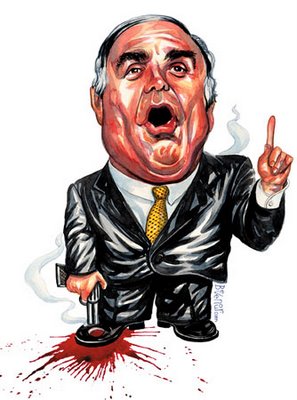 WASHINGTON TIMES: The Treasury Department’s counterterrorism arm is investigating speaking fees paid to a long-time Democratic Party leader who is among the most vocal advocates of an Iranian opposition group designated as a terrorist group by the State Department. Former Pennsylvania Gov. Edward G. Rendell told The Washington Times that Treasury investigators last week subpoenaed records related to payments he has accepted in exchange for public speaking engagements. Mr. Rendell is among a bipartisan group of prominent former officials – including Cabinet-level Republicans – who have accepted payment in exchange for speeches calling for the removal of the Mujahideen-e Khalq (MEK) from the State Department’s list of Foreign Terrorist Organizations. The MEK, also known as the People’s Mujahedin of Iran, has long called for the overthrow of the Islamic theocracy in Tehran. The group, which engaged in terror attacks on Iranian government targets in the 1980s, has been on the terrorist list since 1997, when President Bill Clinton put it there in an attempt to improve relations with Iran. Mr. Rendell and others argue the MEK should be removed from the list because it has not engaged in violence in more than two decades and shares a common enemy with the United States. While support for their position is widespread in Washington, some observers have raised questions about the legality of accepting payment in exchange for providing assistance or services to a listed terror group. Mr. Rendell, who asserts that he has done nothing illegal, said that on Feb. 29 the Treasury Department’s Office of Foreign Assets Control issued a subpoena seeking “transactional records about what payments we received for speaking fees.” A Treasury Department spokesman on Friday refused to confirm or deny the subpoena’s issuance, saying the department “does not comment on possible investigations. But the MEK is a designated terrorist group, therefore U.S. persons are generally prohibited from engaging in transactions with or providing services to this group,” the spokesman said. Designated terrorist groups are subject to sanctions and the spokesman, added that “the Treasury Department takes sanctions enforcement seriously and routinely investigates potential violations of sanctions laws.” Mr. Rendell said the subpoena sent to his agent seeks information “about any emails, any letters, any communications involving payment that we’ve received or sent back.” “We’re absolutely cooperating 100 percent,” he said. “I’ve instructed my agent not to hold back on any emails or any documents. There’s nothing to hide.” MORE
WASHINGTON TIMES: The Treasury Department’s counterterrorism arm is investigating speaking fees paid to a long-time Democratic Party leader who is among the most vocal advocates of an Iranian opposition group designated as a terrorist group by the State Department. Former Pennsylvania Gov. Edward G. Rendell told The Washington Times that Treasury investigators last week subpoenaed records related to payments he has accepted in exchange for public speaking engagements. Mr. Rendell is among a bipartisan group of prominent former officials – including Cabinet-level Republicans – who have accepted payment in exchange for speeches calling for the removal of the Mujahideen-e Khalq (MEK) from the State Department’s list of Foreign Terrorist Organizations. The MEK, also known as the People’s Mujahedin of Iran, has long called for the overthrow of the Islamic theocracy in Tehran. The group, which engaged in terror attacks on Iranian government targets in the 1980s, has been on the terrorist list since 1997, when President Bill Clinton put it there in an attempt to improve relations with Iran. Mr. Rendell and others argue the MEK should be removed from the list because it has not engaged in violence in more than two decades and shares a common enemy with the United States. While support for their position is widespread in Washington, some observers have raised questions about the legality of accepting payment in exchange for providing assistance or services to a listed terror group. Mr. Rendell, who asserts that he has done nothing illegal, said that on Feb. 29 the Treasury Department’s Office of Foreign Assets Control issued a subpoena seeking “transactional records about what payments we received for speaking fees.” A Treasury Department spokesman on Friday refused to confirm or deny the subpoena’s issuance, saying the department “does not comment on possible investigations. But the MEK is a designated terrorist group, therefore U.S. persons are generally prohibited from engaging in transactions with or providing services to this group,” the spokesman said. Designated terrorist groups are subject to sanctions and the spokesman, added that “the Treasury Department takes sanctions enforcement seriously and routinely investigates potential violations of sanctions laws.” Mr. Rendell said the subpoena sent to his agent seeks information “about any emails, any letters, any communications involving payment that we’ve received or sent back.” “We’re absolutely cooperating 100 percent,” he said. “I’ve instructed my agent not to hold back on any emails or any documents. There’s nothing to hide.” MORE
PHAWKER: Weirdly, nothing about this on Philly.com.
